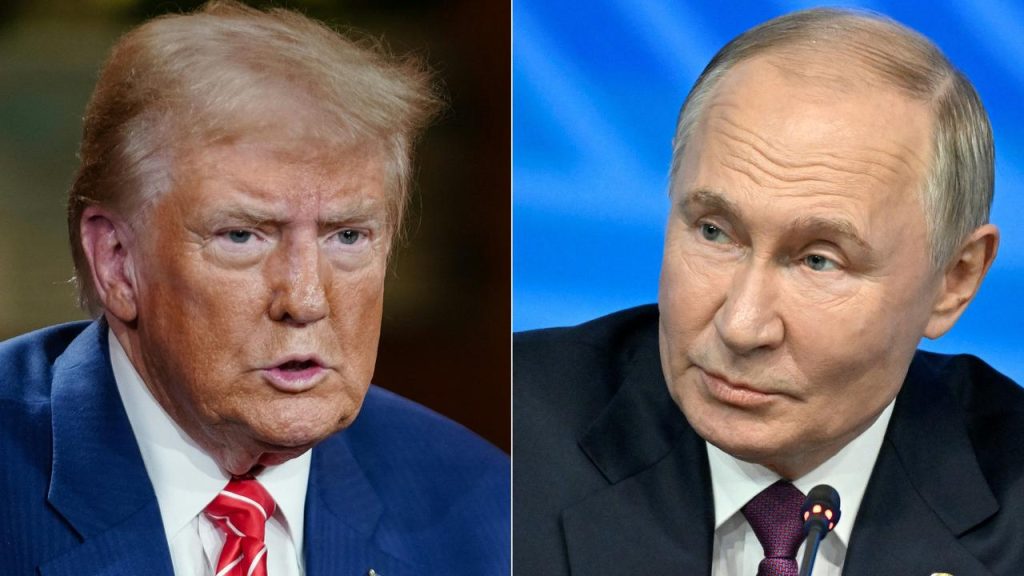
The Kremlin has rejected media reports claiming that US President-elect Donald Trump held a phone call with Russian President Vladimir Putin, warning him against escalating the war in Ukraine. The reports, first published by The Washington Post on Sunday, suggested that Trump had also mentioned the extensive US military presence in Europe during the conversation.
Kremlin spokesperson Dmitry Peskov dismissed these claims, calling them “pure fiction” and categorically denying that such a conversation had taken place. “This is completely untrue, it is pure fiction,” Peskov said, labeling the reports as false. Trump’s team, in response, also refused to comment on the matter, with communications director Steven Cheung telling the BBC, “We do not comment on private calls between President Trump and other world leaders.”
The alleged phone call came just days after Trump’s recent victory in the 2024 US presidential election. Trump has long promised to end the ongoing war in Ukraine, although he has yet to reveal a detailed plan for achieving this goal. Meanwhile, Ukrainian President Volodymyr Zelensky has repeatedly warned against negotiating land concessions to Russia, emphasizing that without continued support from the US, Ukraine would be at risk of losing the war.
Despite the Kremlin’s dismissal, there have been indications that Trump’s administration may approach the war in Ukraine differently. Peskov spoke to Russian state media on Sunday, noting “positive” signals from the incoming US president. However, Western leaders, including British Defence Secretary John Healey, remain confident that the US will continue to support Ukraine. Healey expressed his belief that the US would “stand with Ukraine for as long as it takes to prevail over Putin’s invasion.”
As the war continues, there have been calls from European leaders for a resolution that ensures any peace is sustainable. EU foreign policy chief Josep Borrell, during a visit to Ukraine on Sunday, warned against ending the war hastily. “How matters,” he stressed, cautioning that rushing to end the war without considering long-term stability could lead to further conflict.
In the US, National Security Adviser Jake Sullivan indicated that outgoing President Joe Biden would make the case to Trump that disengaging from Ukraine would lead to greater instability in Europe, particularly in the context of Russia’s ongoing aggression.
Germany’s Foreign Minister, Annalena Baerbock, echoed these concerns, warning that Putin could exploit the transition period between the Biden and Trump administrations to gain an advantage in Ukraine. She called on European Union member states to expedite their support for Kyiv, stating, “Now is the transition phase that Putin has been waiting for and aiming for.”
Meanwhile, fighting on the frontlines in Ukraine continues to intensify. In the eastern Donetsk region, a dam near the front line was damaged on Monday after a Russian strike hit the Kurakhove reservoir. Local officials warned that rising water levels could threaten nearby settlements along the Vovcha River. Russia, however, claimed that Ukraine was responsible for the damage.
The weekend also saw some of the largest drone attacks since the start of the war. Russia’s Ministry of Defence reported intercepting 84 Ukrainian drones over six regions, including some targeting Moscow. The drones caused major disruptions at Moscow’s airports, forcing flights to be diverted. On the other hand, Ukraine’s Air Force reported that Russia launched 145 drones toward various parts of the country on Saturday night, though most of these were shot down.
As the air strikes continue, casualties mount. On Monday, at least six people were killed, and 21 others were injured following a new series of Russian air strikes. Zelensky condemned the attacks, describing them as terror against civilians. “Every day, every night, Russia unleashes the same terror,” he wrote on Twitter. “More and more civilian sites are being targeted. Russia only wants to continue the war, and each of its strikes negates any claims of diplomacy from Russia.”
Zelensky has continued to call for stronger international support, particularly for more weapons to help Ukraine defend itself against Russian aggression.
In other developments, Moscow’s Defence Ministry announced that Russian forces had captured the village of Kolisnykivka in Ukraine’s Kharkiv region. Russian territorial gains in October were reportedly the largest since March 2022, according to analysis by the Institute for the Study of War, underscoring the ongoing push by Russian forces to secure key territories in eastern Ukraine.
As the war grinds on, the geopolitical landscape continues to shift. Tensions surrounding the transition of US leadership, alongside continued military developments on the ground in Ukraine, have the potential to influence the course of the conflict. With Russia’s territorial gains in the east, and concerns over the political stability in the West, the situation remains precarious as both sides prepare for what could be a long and protracted struggle. The international community’s response, particularly from key allies like the US, remains a critical factor in Ukraine’s fight for sovereignty and security.





